Continuing to Support the Ukrainian People

As Ukraine continues to fight Vladimir Putin's unprovoked, barbaric attacks, it becomes more and more clear that the Russian dictator has made a huge miscalculation. In response to Russia's heinous actions, the United States has assembled an impressive coalition of allies and partners to provide unpreceded military weaponry and humanitarian aid to Ukraine, imposed severe sanctions on the Russian economy, and put Putin's army on their back foot for now.
Our transatlantic international coalition is working closely and carefully to give the brave Ukrainian fighters tools they need to win. Currently, the U.S. has delivered billions in military aid to the Ukrainian people – including:
- Over 1,400 Stinger anti-aircraft systems;
- Over 5,500 Javelin anti-armor systems;
- Over 14,000 other anti-armor systems;
- Over 700 Switchblade Tactical Unmanned Aerial Systems (drones);
- 90 155mm Howitzers and 183,000 155mm artillery rounds;
- 16 Mi-17 helicopters;
- Hundreds of Armored Personnel Carriers;
- Over 7,000 small arms;
- Over 50,000,000 rounds of ammunition;
- And 75,000 sets of body armor and helmets.
That just scratches the surface of the military aid we're sending them, and there will be more to come in the weeks ahead. Congress also just passed the Ukraine Lend-Lease Act, legislation I co-sponsored that will help the U.S. export military equipment to Ukraine. The bill revives the "Lend-Lease Act" from World War II, which gave Europe weapons to fight Hitler and cemented the United States as the “Arsenal of Democracy." When signed into law, this new effort will strengthen our already effective military aid that has enabled Ukrainian troops to push Russian forces back from Kyiv.
Not only has Putin clearly made a huge military miscalculation, but he's also made a diplomatic one as well. In recent weeks, Sweden and Finland have expressed interest in joining NATO, Germany has dramatically shifted their foreign policy, and Europe is getting further away from Russian energy.
My late colleague John McCain used to say Russia is nothing but a gas station with an army – well, now it's jeopardizing both. I joined MSNBC's Morning Joe earlier this week to share my full thoughts on the situation; you can watch the conversation HERE.
As we continue to increase our military aid, it's also important we keep up the pressure on economic sanctions. It is time for us to close any possible escape hatch Putin could use to help fund his unconscionable war, which is why I’ve introduced the Stop Russian GOLD Act with a bipartisan group of my colleagues to target Russia's ability to fund the war using their large gold reserves, and the Digital Asset Sanctions Compliance Enhancement Act which would go after Russian digital assets. They're both important steps to keep up the pressure on Putin and his war machine.
I’m praying for the people of Ukraine who are needlessly caught in this conflict. We will continue pushing – together – to hold Russia and Putin accountable and to help the brave men and women fighting for their freedom win this war.
Bringing Attention to the Mental Health Crisis
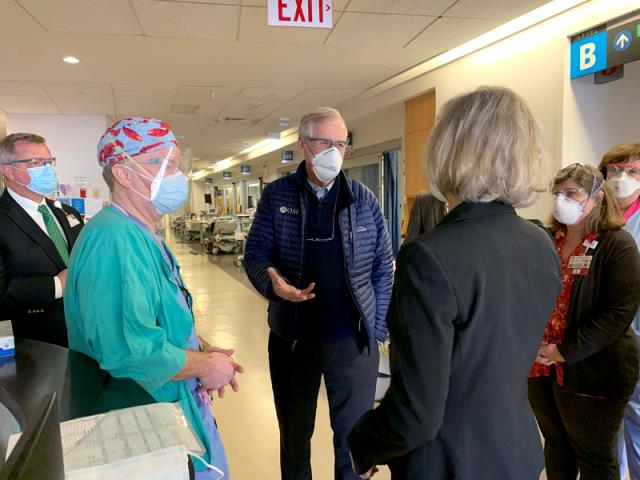
For more than two years, the COVID-19 pandemic has drastically changed life for Maine people from all walks of life. As we have worked to secure our physical health from the dangers of COVID-19, we’ve all experienced unprecedented struggles: increased stresses, social isolation, the loss of loved ones, frayed support networks, and more. These factors, combined with pre-existing stigmas and insufficient resources, have fueled an epidemic within the pandemic – an epidemic of mental and behavioral health.
In 2020, one out of every five adults in the United States experienced mental illness. That number is even higher for Maine kids. When we talk about mental and behavioral illnesses, we’re talking about life-threatening conditions with services often too difficult to reach for many Maine people, whether due to a shortage of mental health providers to geographic barriers to the distance needed to travel to visit a doctor.
These hurdles to specialized care leaves many Mainers with two bad choices. First, they can reach out to a non-specialized medical professional at already-overwhelmed emergency room departments. The second option is even worse: a person in need chooses to not seek help. Neither of these are acceptable, which is why we need to devote significant time and effort to creating adequate resources to meet this vital need.
Given the wide range of obstacles that contribute to these issues, any effort to strengthen mental and behavioral healthcare requires an “all of the above” approach. That is why I’ve introduced or am supporting a number of bills to tackle this issue from all angles, including legislation to require private health insurance to cover three behavioral health care visits each year, support social-emotional learning for children, increase access to mental health resources in schools, and address childhood trauma.
In addition, I have strongly advocated for increased funding to strengthen substance use disorder treatments and support our mental health workforce through both Congress’s budget bills and the American Rescue Plan. We must understand that there is far too much that we don’t know about mental and behavioral health, which is why I wholeheartedly believe that we need to increase funding for research into these crucial but underfunded areas of study.
We’re at a critical moment in time that will define the health of friends and loved ones for decades. We must use this crisis as an opportunity to improve shortcomings in how our nation addresses mental and behavioral health. We see the problems, so let’s continue pushing for the solutions and investments that will make a difference. Now is the time for all of us to rise to this daunting challenge.
You can read my full thoughts on this challenge, and what we need to do to address it, in the Bangor Daily News.
Honoring Maine and America's Veterans

Maine is proud to be home for thousands of veterans and servicemembers. These men and women are living reminders of the power of service and the values of our county. The sacrifices our veterans made were immense, and we have a responsibility to honor all they have done to defend our freedoms – starting by ensuring that Maine and America's veterans receive the benefits they earned.
For decades, Maine Veterans’ Homes (MVH) has met that responsibility to support our veterans – which is why I was so concerned when I learned earlier this year that they would be closing their Caribou and Machias facilities. The closure would have had drastic impacts on the dozens of veterans and spouses of veterans who live in those facilities and the more than 120 staff members who work in the homes – that's why I joined the rest of Maine’s Congressional delegation in calling for action to protect these sites.
Fortunately, earlier this month MVH – in partnership with Governor Janet Mills and bipartisan leaders from the Maine Legislature – found a solution that will keep the homes open and ensure that these veterans can remain close to their communities and loved ones. The solution drew widespread support, illustrating once again that our duty to honor our veterans transcends any partisan disagreements. This is an important victory for Maine veterans, and I urge continued dialogue to secure the future of these facilities.
Even as we celebrate this good news, there is much work to be done to better support our veterans. One challenge facing many Maine veterans right now is the overly-complicated, and sometimes unfair benefits system. Currently, military retirees with combat-related injuries qualify for retirement pay for their service from the Department of Defense and for disability compensation for injuries acquired in combat from the Department of Veterans Affairs. However, for retired veterans with less than 20 years of service, their disability pay is deducted from their retirement pay.
This is simply not right. Disabled veterans made extraordinary sacrifices for our country and our freedoms; they deserve our thanks, and they certainly deserve full benefits.
That's why I joined a bipartisan group of my colleagues to co-sponsor the Major Richard Star Act that would ensure these heroes who were wounded while serving receive the proper care and support, without costing them the pay they earned through a medical retirement. This legislation will bring us closer to fulfilling our nation’s bedrock commitment to our servicemembers, and I hope it passes through Congress swiftly.
Laying Out the Facts of Climate Change
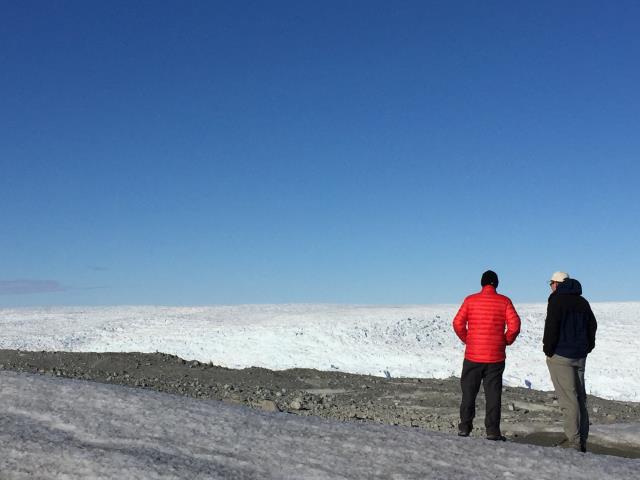
I have never understood how climate science became a partisan issue. We don’t debate the value of pi or the temperature at which water boils, but mention “climate change” or “global warming” and the partisan gloves come off. To me it’s a matter of numbers and what we see around us, like earlier ice-out in Maine lakes or lobsters moving north. These charts spell out the numbers and what’s in store if we continue business as usual.
The first is probably the most important – the percentage of heat-trapping CO2 in the atmosphere over the past 800,000 years. Yes, it varies on pretty regular cycles, but as you can see, we’re way above any prior peak and headed into literally uncharted territory.

The next is more recent history and shows the correlation between the current increase in CO2 and temperature.
Next is the long-term trend in temperature, followed by a practical snapshot of what’s happening in the real world – a two-thirds decline in Arctic sea ice in the last 40 years.
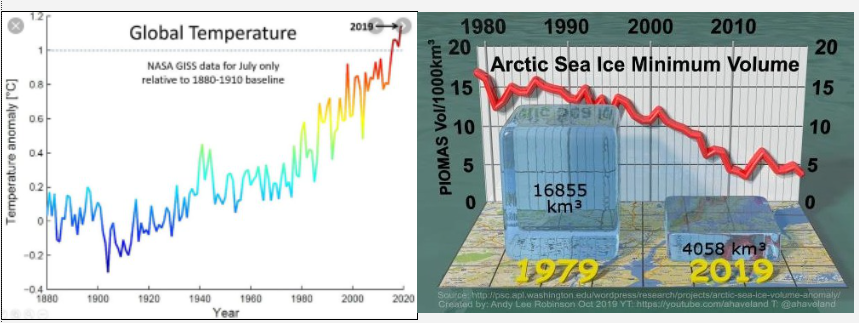
Finally, a fascinating – and scary – graph of ocean depth over the past 25,000 years (the period since the last ice age) which shows the relationship between glaciers and ocean depth.

At the height of the last ice age, the ocean was 390 feet shallower than it is today (you could walk from Portland to Georges Bank). As the ice melted, the sea level rose – sometimes as fast as a foot a decade – to reach the current level where it’s been for the past 8,000 years (most of recorded human history). But there are still two huge bodies of ice left – Greenland and Antarctica, which contain about 225 feet of additional sea level rise between them. Drop an ice cube into a glass of water – and think New York, New Orleans, all of Florida, Bangladesh, or just about any island that comes to mind.
There are solutions, but we’ll never get there until we agree there’s a problem.
Confirming an Exceptionally Qualified Supreme Court Nominee
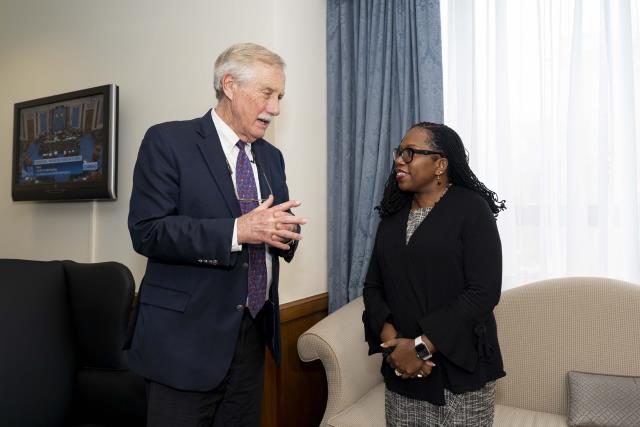
It was an honor to cast my vote confirming Judge Ketanji Brown Jackson to the Supreme Court this month. Judge Jackson is one of the most impressive people I have ever met. After reviewing her record, attending a portion of her hearing, and meeting with her in person, it became clear that Judge Jackson is a brilliant legal mind with wide-ranging experience and an even judicial temperament well-suited for the highest court in the land. Her deep knowledge of the law was on full display during our conversation, as she provided thoughtful responses to pointed questions and repeatedly displayed her talent for assessing a case from every possible angle.
It was a privilege to support her confirmation to our nation's highest court, and I look forward to seeing her valuable contributions in the years ahead.
Making Public Lands Easier to Access
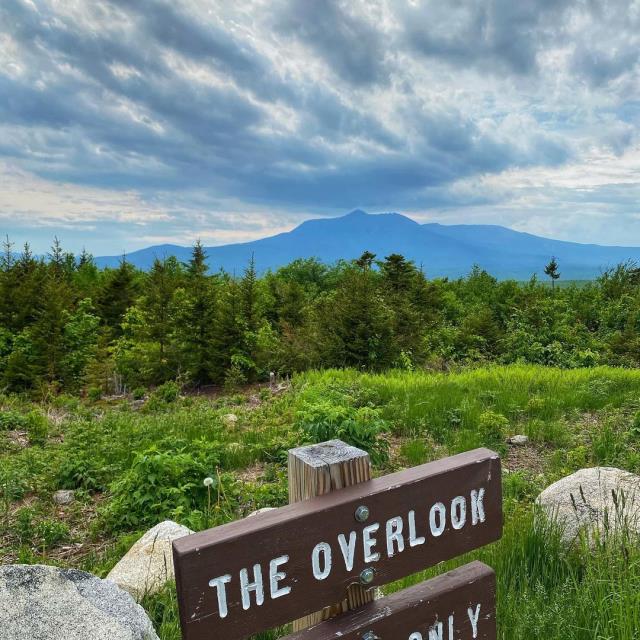
America’s public lands have always enabled our citizens to get outside to explore the natural beauty that surrounds us – and in recent years, the call of the wild has grown even stronger for people across our nation.
On the Senate National Parks Subcommittee, we've been working on a bipartisan basis to ensure these natural wonders can be accessed by as many Americans as possible, while preserving their beauty for generations to come.
As part of this work, the Senate unanimously passed bipartisan legislation this month that will make it easier for America’s hunters, fishers, and adventurers to recreate safely, using the latest mapping technologies to help more Americans access our public lands. The Modernizing Access to our Public Land (MAPLand) Act, requires public land mapping records digitized and standardized, so when you want to visit a park or public lands, you can easily find access points and permissible uses right on your phone. It will hopefully improve recreational access, including for hunting and fishing, and will be a significant step in our work to help public lands benefit from 21st century technology.
I’m grateful that this important public lands legislation passed through Congress with strong bipartisan support and was signed into law by President Biden. I look forward to seeing how it supports our nation’s outdoor enthusiasts. Senator Steve Daines (R-Montana), the Ranking Member of the National Parks Subcommittee, and I sat down for my monthly "Inside Maine" podcast to discuss this bill and what it means for our great outdoors, you can listen to that episode HERE.
Supporting Access to Free School Lunches
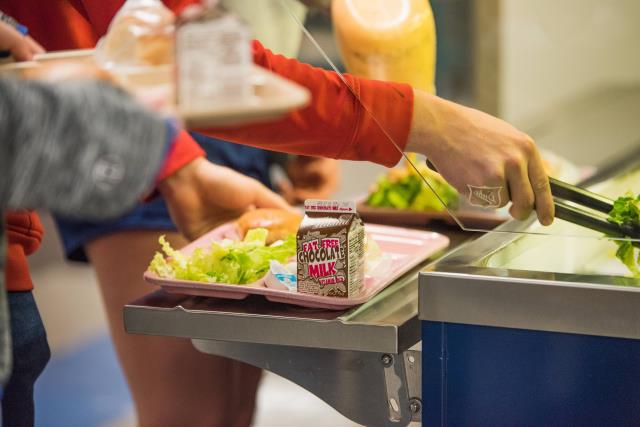
The COVID-19 pandemic has further highlighted the importance of school meals for tens of thousands of Maine families. As the pandemic took some kids out of school for extended periods of time and families have faced difficulty putting food on the table, we saw just how important free school lunches are. In our state and across the country, schools have done a tremendous job stepping up to the challenges of the pandemic and working to support the basic nutritional needs of students, helping to alleviate hunger and allowing students to focus on their studies.
As we emerge from this public health crisis, it is crucial that children are able to continue enjoying nutritious meals not only during the school year, but in all regions of Maine during the summer as well. In addition to supporting students and families, many schools in Maine and across the country are short staffed and struggling to manage the added burden of supply chain disruptions.
To address this pressing issue, I sponsored the Support Kids Not Red Tape Act that would extend federal school meal flexibilities from June 30, 2022, to September 30, 2023. These flexibilities have been crucial to feeding children throughout the pandemic, and the extension would give our schools and summer meal programs much-needed support to deal with ongoing food service issues and keep kids fed.
This legislation builds on the work by Governor Mills to provide free school meals for all children in Maine, would deliver vital assistance to our school systems, and would help ensure that no child is having to go hungry while learning.
April Policy Update
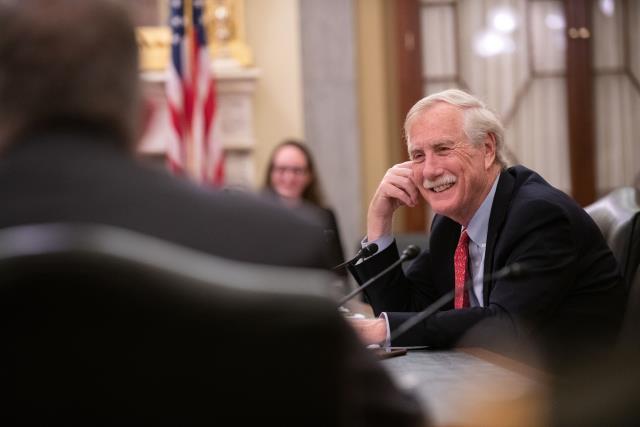
As a reminder, you can read more on my regularly updated press release page at king.senate.gov. Here are some other priorities I’ve been working on:
- Supporting Maine shipyards. I've been highlighting to top Pentagon Officials the importance of multi-year defense contracts that provide long term stability to America’s national defense and shipyards like Bath Iron Works (BIW) and Portsmouth Naval Shipyard (PNSY). Read more HERE.
- Investing in Maine's fishing industry. Kennebunkport will be receiving a vital $2.2 million grant for the reconstruction of the Cape Porpoise commercial pier that will support the region’s commercial fishing industry and ensure its resilience to storms and floods. Read more HERE.
- Keeping a key cyberdeterrent. Representative Mike Gallagher (R-Wisc.) and I, Co-Chairs of the Cyberspace Solarium Commission (CSC), are urging President Joe Biden to keep a key cyberdeterrent in place after reports that the administration is considering changes to the policy. Read more HERE.
- Addressing IRS difficulties. In the face of consistent challenges and delays, I highlighted the unnecessary stresses Internal Revenue Service (IRS) issues caused Maine people leading up to the tax filing deadline and called on the Service to urgently improve customer resources. Read more HERE.
- Improving public transit. Maine is receiving $47,583,555 in funds for public transit from the bipartisan Infrastructure Investment and Jobs Act. The funds will support local public transit systems across Maine including buses, rail lines, and ferries. Read more HERE.
In The News

Thanks for subscribing to my monthly newsletter! I would love to hear your ideas for how we can make Maine and our country a better place. Please feel free to reach out with any questions, comments, or concerns by visiting: https://www.king.senate.gov/contact —we look forward to hearing from you.
All the best, and stay healthy!

To unsubscribe to this e-Newsletter click HERE.
|